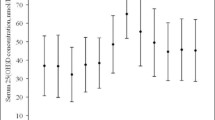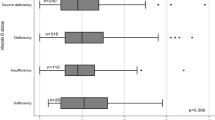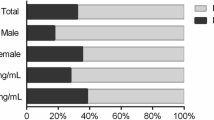Abstract
Although low serum 25-hydroxyvitamin D (25(OH)D) and elevated serum parathyroid hormone (PTH) have been associated with depression in clinical settings, this link in community-dwelling individuals is inconclusive. The present study aimed at examining the association between serum 25(OH)D and PTH levels and the presence of depression in a national population-based household sample of 4,002 Jordanian participants aged ≥25 years. The DASS21 depression scale was used to screen for depression, and serum concentrations of 25(OH)D and PTH were measured by radioimmunoassay. Multiple logistic regression models were used to explore the association between serum 25(OH)D and PTH levels and depression. The unadjusted odds ratio (OR) decreased linearly with increasing quartiles of serum 25(OH)D (P trend = 0.00). The OR for having depression was significantly higher among individuals in the first and second quartiles (OR = 1.4, 1.23, respectively) than among those in the fourth quartile (P values = 0.00 and 0.03, respectively). This relationship remained significant after adjusting for age, sex, marital status, education, BMI, serum creatinine, number of chronic diseases (OR = 1.39 and 1.21 and P values = 0.00 and 0.05, respectively) and after further adjustment for exercise, altitude, and smoking (OR = 1.48 and 1.24, respectively, and P values = 0.00 and 0.03, respectively). No significant association was found between serum PTH levels and depression. The decrease in risk of depression among participants started to be significant with serum 25(OH) D levels higher than 42.3 ng/ml (lower limit of the range of the third quartile). This value may help pinpoint the desirable level of serum 25(OH)D to be attained to help aid the prevention and treatment of depression.
Similar content being viewed by others
References
Gelenberg AJ (2010) The prevalence and impact of depression. J Clin Psychiatry 71(3):e06
Williams L, Jacka F, Henry M, Dodd S, Nicholson G, Kotowicz M, Berk M (2010) The prevalence of mood and anxiety disorders in Australian women. Australas Psychiatry 18(3):250–255
Barcelos-Ferreira R, Izbicki R, Steffens DC, Bottino CM (2010) Depressive morbidity and gender in community-dwelling Brazilian elderly: systematic review and meta-analysis. Int Psychogeriatr 22(5):712–726 Epub 2010 May 18
Zatzik D, Jukovich GJ, Riara FP, Wang FP, Joesch J, Mackenzie E (2008) A national US study of posttraumatic stress disorder, depression, and work and functional outcomes after hospitalization for traumatic injury. Ann Surg 248(3):429–437
Clarke DM, Currie KC (2009) Depression, anxiety and their relationship with chronic diseases: a review of the epidemiology, risk and treatment evidence. Med J Aust 190(7 Suppl):S54–S60
Van der Kooy K, Van Hout H, Marwijk H, Marten H, Stehouwer C, Beekman A (2007) Depression and the risk of cardiovascular diseases: systematic review and meta analysis. Int J Geriatr Psychiatry 22(7):613–626
Demakakos P, Pierce MB, Hardy R (2010) Depressive symptoms and risk of type 2 diabetes in a national sample of middle-aged and older adults: the English longitudinal study of aging. Diabetes care 33(4):792–797. Epub 2010 Jan 19
Holick MF (2007) Vitamin D deficiency. N Engl J Med 357:266–268
Looker AC, Dawson-Hughes B, Calvo MS, Gunter EW, Sahyoun NR (2002) Serum 25-hydroxyvitamin D status of adolescents and adults in two seasonal subpopulations from NHANES III. Bone 30:771–777
Tangpricha V, Scanlon KS, Chen TC, Holick MF (2002) Vitamin D insufficiency among free-living healthy young adults. Am J Med 112:659–662
Hyppönen E, Power C (2007) Hypovitaminosis D in British adults at age 45 y: nationwide cohort study of dietary and lifestyle predictors. Am J Clin Nutr 85(3):860–868
Hintzpeter B, Mensink GB, Thierfelder W, Müller MJ, Scheidt-Nave C (2008) Vitamin D status and health correlates among German adults. Eur J Clin Nutr 62(9):1079–1089. Epub 2007 May 30
Lamberg-Allardt CJ, Outila TA, Kärkkainen MU, Rita HJ, Valsta LM (2001) Vitamin D deficiency and bone health in healthy adults in Finland: could this be a concern in other parts of Europe? J Bone Miner Res 16(11):2066–2073
Sedrani SH (1984) Low 25-hydroxyvitamin D and normal serum calcium concentrations in Saudi Arabia: Riyadh region. Ann Nutr Metab 28:181–185
McGrath JJ, Kimlin MG, Saha S, Eyles DW, Parisi AV (2001) Vitamin D insufficiency in south-east Queensland. Med J Aust 174:150–151
Mishal AA (2001) Effects of different dress styles on vitamin D levels in healthy young Jordanian women. Osteoporos Int 12:931–935
Lee DM, Tajar A, O’Neill TW, O’Connor DB, Bartfai G, Boonen S, Bouillon R, Casanueva FF, Finn JD, Forti G, Giwercman A, Han TS, Huhtaniemi IT, Kula K, Lean ME, Punab M, Silman AJ, Vanderschueren D, Wu FC, Pendleton N (2010) Lower vitamin D levels are associated with depression among community-dwelling European men. J Psychopharmacol. doi:10.1177/0269881110379287
Hoogendijk WJ, Lips P, Dik MG, Deeg DJ, Beekman AT, Penninx BW (2008) Depression is associated with decreased 25-hydroxyvitamin D and increased parathyroid hormone levels in older adults. Arch Gen Psychiatry 65(5):508–512
Armstrong DJ, Meenagh GK, Bickle I, Lee AS, Curran ES, Finch MB (2007) Vitamin D deficiency is associated with anxiety and depression in fibromyalgia. Clin Rheumatol 26(4):551–554. Epub 2006 Jul 19
Zhao G, Ford ES, Li C, Balluz LS (2010) No associations between serum concentrations of 25-hydroxyvitamin D and parathyroid hormone and depression among US adults. Br J Nutr 20:1–7. [Epub ahead of print]
Pan A, Lu L, Franco OH, Yu Z, Li H, Lin X (2009) Association between depressive symptoms and 25-hydroxyvitamin D in middle-aged and elderly Chinese. J Affect Disord 118(1–3):240–243. Epub 2009 Feb 27
Dumville JC, Miles JN, Porthouse J, Cockayne S, Saxon L, King C (2006) Can vitamin D supplementation prevent winter-time blues? A randomized trial among older women. J Nutr Health Aging 10(2):151–153
Batieha A, Khader Y, Jaddou H, Hyassat D, Batieha Z, Khateeb M, Belbisi A, Ajlouni K (2011) Vitamin D status in Jordan: dress style and gender discrepancies. Ann Nutr Metab 58(1):10–18. Epub 2011 Jan 19
Yousef K, Anwar B, Hashim J, Mohammed E-K, Kamel A (2010) Metabolic syndrome and its individual components among Jordanian children and adolescents. Int J Pediatr Endocrinol 2010(316170):7. doi:10.1155/2010/316170
Godin G, Shephard RJ (1985) A simple method to assess exercise behavior in the community. Can J Appl Sport Sci 10:141–146
Pate RR, Pratt M, Blair SN et al (1995) Physical activity and public health: a recommendation from the Centers for Disease Control and Prevention and the American College of Sports Medicine. JAMA 273:402–407
Taouk M, Lovibond PF, Laube R Psychometric properties of an Arabic version of the depression anxiety stress scales (DASS21). Report for New South Wales Transcultural Mental Health Centre, Cumberland Hospital, Sydney
Antony M, Bieling PJ, Cox BJ, Enns MW, Swinson RP (1998) Psychometric properties of the 42-item and 21-item versions of the depression anxiety stress scales in clinical groups and community a sample. Psychol Assess 10:176–181
Lovibond SH, Lovibond PF (1995) Manual for the depression anxiety stress scales. The Psychology Foundation of Australia, Sydney
Crawford JR, Henry JD (2003) The depression anxiety stress scales (DASS): normative data and latent structure in a large non-clinical sample. Br J Clin Psychol 42(2):111–131
Crawford JR, Henry JD (2005) The short-form version of the depression anxiety stress scales (DASS-21): construct validity and normative data in a large non-clinical sample. Br J Clin Psychol 44(Pt 2):227–239
Sardá J Jr, Nicholasc MK, Pimentad CA, Asgharie A (2008) Psychometric properties of the DASS-depression scale among a Brazilian population with chronic pain. J Psychosom Res 64(1):25–31
Psychology Department. UNSW—http://www.psy.unsw.edu.au/dass
Stumpf WE, O’Brien LP (1987) 1, 25(OH)2 vitamin D3 sites of action in the brain: an autoradiographic study. Histochemistry 87(5):393–406
Rahman SA, Marcu S, Kayumov L, Shapiro CM (2010) Altered sleep architecture and higher incidence of subsyndromal depression in low endogenous melatonin secretors. Eur Arch Psychiatry Clin Neurosci 260(4):327–335
Perona MT, Waters S, Hall FS, Sora I, Lesch KP, Murphy DL, Caron M, Gr Uhl (2008) Animal models of depression in dopamine, serotonin, and norepinephrine transporter knockout mice: prominent effects of dopamine transporter deletions. Behav Pharmacol 19(5–6):566–574
Martins-de-Souza D, Harris LW, Guest PC, Turk CW, Bahn S (2010) The role of proteomics in depression research. Eur Arch Psychiatry Clin Neurosci 260(6):499–506
Burne TH, Johnston AN, McGrath JJ, Mackay-Sim A (2006) Swimming behavior and post-swimming activity in vitamin D receptor knockout mice. Brain Res Bull 69:74–78
Eyles DW, Smith S, Kinobe R, Hewison M, McGrath JJ (2005) Distribution of vitamin D receptor and 1 alpha-hydroxylase in human brain. J Chem Neuroanat 29:21–30
Sonnenberg J, Luine VN, Krey LC, Christakos S (1986) 1, 25 Dihydroxyvitamin D3 treatment results in increased choline acetyltransferase activity in specific brain nuclei. Endocrinology 118:1433–1439
Kilkkinen A, Knekt P, Aro A, Rissanen H, Marniemi J, Heliovaara M, Impivaara O, Reunanen A (2009) Vitamin D status and the risk of cardiovascular disease death. Am J Epidemiol 170(8):1032–1039. Epub 2009 Sep
Acknowledgments
This work was supported by a grant from the Scientific Research Fund/Ministry of Higher Education/Jordan. The Ministry of Health/Jordan has facilitated our field work by providing their primary health centers to be used for conducting this research. The National Center for Diabetes, Endocrine and Genetics/Jordan has provided their facility for the logistic support.
Conflict of interest
The authors declare that they have no conflict of interest.
Author information
Authors and Affiliations
Corresponding author
Rights and permissions
About this article
Cite this article
Jaddou, H.Y., Batieha, A.M., Khader, Y.S. et al. Depression is associated with low levels of 25-hydroxyvitamin D among Jordanian adults: results from a national population survey. Eur Arch Psychiatry Clin Neurosci 262, 321–327 (2012). https://doi.org/10.1007/s00406-011-0265-8
Received:
Accepted:
Published:
Issue Date:
DOI: https://doi.org/10.1007/s00406-011-0265-8




